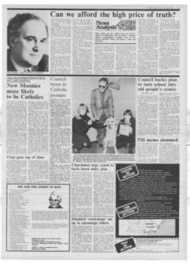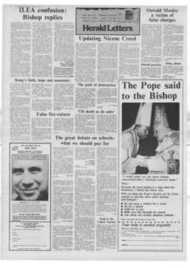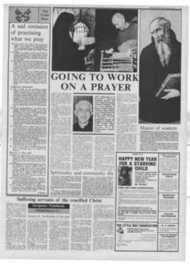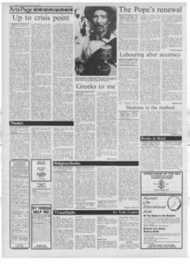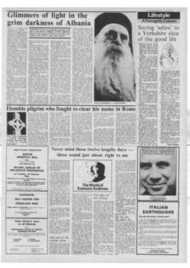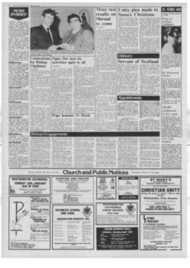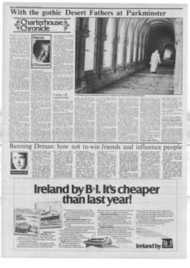Page 4, 16th January 1981
Page 4
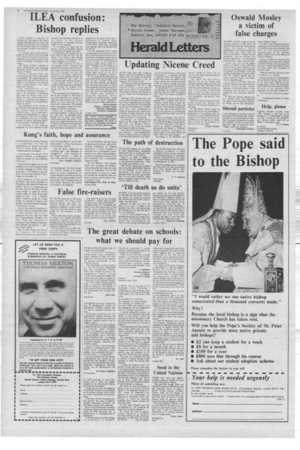
Report an error
Noticed an error on this page?If you've noticed an error in this article please click here to report it.
Tags
Share
Related articles
Bishop Konstant Replies On Schools
Caning Inquiry At Catholic Schools
The Needful Involvement Over Schools
Diocesan Doubts
Bishop Denies Ilea Leant On Atholic School
ILEA confusion: Bishop replies
I WAS surprised to discover on reading the front page of last week's Catholic Herald January 9. that I had banned thepublication of a minute of the Westminster Schools Committee concerning its attitude to the future of the ILEA.
It is strange that a story which is judged by the editor to be front page news, does not merit the courtesy of a telephone call or other enquiry to the person principally concerned in the matter.
The report contains a number of major misstatements and damaging innuendos which I need to have the chance to refute.
The use of the word "ban", with the overtones which this word carries, is unjustified. The original decision to oppose the break-up of the ILEA was made by the bishops of the diocese after consultation with their educational advisers.
The responsibility of the Westminster Schools Committee and of the Education Commission itself since the future of the ILEA affects the work of the whole Cornmission — is among other things to advise the bishops on an appropriate course of action.
The publication of the minute of the Schools Committee discussion on this matter would be entirely inappropriate, The Committee's original recommendation to oppose the break-up of the ILEA was based on educational and not on political grounds: its present recommendation on the question is similarly based.
The linking in the opening paragraph by your reporter of the attitude of the diocese to the future of the ILEA,' to the current reorganisation of secondary schools, verges on the insulting.
It is monstrous to imply that the diocese would contemplate playing one situation off against the other.
I accept that your reporter may not have meant what he said, but the import of his words is clear enough and the theme is developed at some length throughout the report.
It is simply incorrect to talk of "increasing friction between the (Schools) Committee and the ILEA'". It is incorrect, so far as I know, to say that "the diocese has lost the sympathy of the ILEA". Such statements, however well-intentioned, are misrepresentations that create the very tensions,they pretend to report.
Your reporter writes: "Cuts are needed in the Education Commission, which includes the Schools Cornmittee, and this will mean loss of jobs."
The publication last September of the diocesan budget for 198) made it quite clear that there is no intention of reducing staff in either the Schools Office or other branches of the Education Commission. The briefest direct consultation would have prevented this blatant inaccuracy.
When the reorganisation of secondary schools is mentioned we are told that in deciding which schools are to close, the diocese cannot ignore their site values". I can assure you categorically that the value of sites is not a factor in this important question, and never has' been. You have previously commented in your
columns on my letter of last July to Governors of schools about reorganisation proposals. Reference to this letter would have reminded your reporter which are the determining factors. You will appreciate that it comes as something of a shock for the Chairman of the Education Commission to learn from a newspaper report that he "may even feel that it would be better for him to give up his position as chairman before things come to a head." Whether this is offered as a piece of advice, or is an attempt to read my mind, I can only say that would hope never to act in so irresponsible or negligent a fashion. We all recognise the importance of educational issues and the right of the press to treat of them. Those who have the often difficult and delicate task of facing these issues, as well as those personally affected by any decisions taken, should be able to expect from the press. and especially from the Catholic press, accuracy. a reasonable sensitivity, and an avoidance of sensationalism. I regret deeply that the report referred to failed to live up to these expectations.
David Konstant Bishop in Central London Chairman, Westminster Education Commission London. WI4 The Catholic Herald apologises to Bishop Konstant for failing to contact him before publishing the article in which he was mentioned and regrets the distress this has caused him.
Editor
blog comments powered by Disqus




